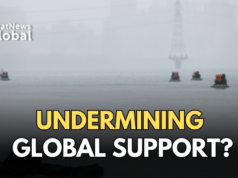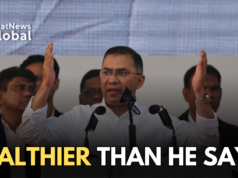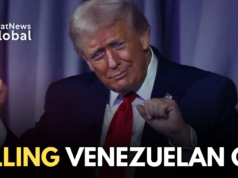NEW DELHI: India’s position on the Ukraine conflict has been expressed in many forums, be it the UN, the G20, and bilaterally with our major partners, including the US. Yet, during the recent visit of Robert Habeck, the German Vice-Chancellor and Economic Affairs Minister, to India for a G20 meeting, while answering a leading question put to him by DW, he wanted India to have a “clear language” on the Ukraine conflict. Why he felt that our language is not “clear” is baffling as we have explained our vote in the UN Security Council several times through our statements.
What Habeck really means is that India should condemn Russia for its unwarranted aggression against Ukraine. We, and many in the Global South, are of the view that the Ukraine conflict has a history and did not begin in February 2022. India does not believe that condemnation of all sides to the conflict serves any purpose. If India condemned Russia, will NATO then return to dialogue and diplomacy, as we have been recommending? If the West’s intention is to have a better score card of countries condemning Russia in their bid to isolate it, but continue their search for a military solution, how does this serve the interests of the non-western world?
Habeck’s description of India’s position as “neutral” is also off the mark. Has NATO declared war on Russia, or for that matter have Russia and Ukraine formally declared war on each other, for us then to announce our neutrality? India is not indifferent. It has been consistently flagging the damage that is being done to the interests of the Global South with food, fertiliser and energy shortages, a message that is being directed at Russia as well as the West.
India has offered to play a role in the search for peace if the conditions are created for it. Turkey has tried its hand and failed, so has China. Ukraine’s peace plan is a non-starter. If the stated goal of the West is Russia’s strategic defeat, even regime change in Russia, reparations by Russia for the damage done to Ukraine, confiscation of its foreign assets to this end—which even Japan supports—and war crimes trial of Russians, including Putin himself, where is the scope for India to play any role? The West, including Germany, has destroyed ties with Russia for years to come. The world is being fragmented making the challenges facing the international community even more severe.
There is a fundamental hollowness in the German position on Ukraine. Habeck claimed he belonged to a party of peace but in his remarks gave no indication that Germany was working for peace. Despite the extreme sensitivity of WW2 German invasion of the Soviet Union and the millions of casualties that resulted, for German arms to be used once again against Russia will have long term consequences for peace and stability in Europe. German Ostpolitik is finished. What can replace it is not clear.
Habeck spoke against countries being neutral in a case of a clear aggressor and a victim, as if this is the first time after WW2 that there has been a clear aggressor and a victim in and around Europe. The bombing of Yugoslavia by NATO is never mentioned by the West, not to mention military action against Iraq, Libya, Syria, etc. The need for Germany to give a moral cover to geopolitics in Europe, and lecturing India on that score, is needlessly jarring.
The German Minister went on to say rather oddly that India changing its position of neutrality on Ukraine would also be “helpful” in India-Germany bilateral ties. He expected neutrality not to be the last word from India. Why he chose to link bilateral ties with our position on Ukraine is not clear. It is not a position that our other western partners take, even if they are not satisfied with our position.
One can understand Habeck’s domestic political need to be seen raising the Ukraine issue on Indian soil and expressing dis-satisfaction with India’s position, with some hedging remarks that were needlessly moral in tone. He should have had the understanding, especially after Prime Minister Modi’s recent visits to the U.S. and France where India stood firm on its position, that flogging this horse publicly in New Delhi gains nothing for Germany. The West has made it clear that their goals in the conflict surpass Ukraine. It wants Ukraine to inflict enough military losses on Russian forces, recapture significant portions of territory Russia has annexed, for which arms and finances are being provided liberally to Ukraine, to force Russia into peace negotiations.
India still has agency on the Ukraine issue, which Germany has lost. Germany, which had refused to join in the U.S. war on Iraq, along with France, is not today’s Germany. The Nord Stream 2 has been blown up (and Nord Stream I damaged too) directly affecting Germany’s energy security, but Germany has not condemned this act or sought to investigate it, and identify those responsible. If Germany cannot condemn its own partners for this act in a vital area, why does it expect India to condemn Russia that has done India no harm?
The European narrative on Ukraine is now so frozen that at European governmental levels the same tune is being sung. Even the French position as expressed by the Diplomatic Adviser to President Macron at the recent Aspen Security Conference in the U.S. was emphatic that Russia cannot be allowed to win in Ukraine come what may, and that everything will be done to support Ukraine to defeat Russia. No doubt Modi and Macron exchanged views on Ukraine when the PM visited France on July 14, and this is what Modi may have been told. The difference is that at the governmental level, France is much more discreet in airing the gap between its position on Ukraine and that of India. The Adviser accepted the reality that the West had not succeeded in mobilising the Global South behind its position, which, he felt, made it necessary to make more efforts to win its support.
The Adviser made the point that the fundamental positions of France and the U.S. were not different, except that Europe wanted to be able to contribute to the shared goal by building Europe’s own capacities. What is of concern is his assessment that Russia has not reacted as expected to NATO supply of more and more potent weapons to Ukraine, which showed Russian weakness, and therefore he seemed to discount fears of escalation on Russia’s part. The implication is that, with the assumption that Putin’s authority has been weakened internally by the recent military rebellion, NATO can continue to up the ante against Russia.
All in all, Europe seems willing to take risks in confronting Russia in Ukraine. It seems to be willing to play with fire. The non-western world is expected to take sides with the West but their concerns about the consequences of the conflict for them do not seem part of western policy making. It is certainly part of the West’s information warfare in seeking to heap all the blame on Russia about the plight of the Global South by way of food, fertiliser, and energy disruptions, which are essentially collateral damage from the NATO-Russia confrontation in Europe.
(This article appeared first on indianarrative.com. Kanwal Sibal is a former Foreign Secretary and ex-Ambassador to Russia. Views expressed in this article are personal.)





